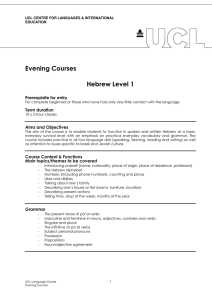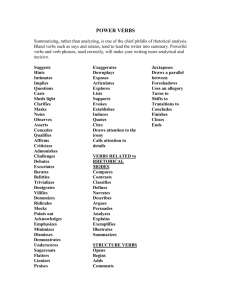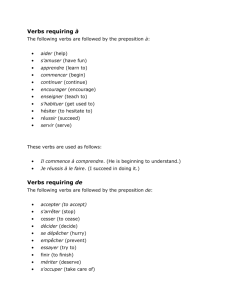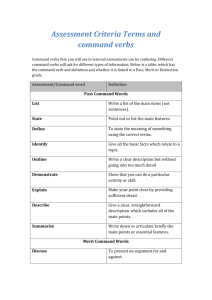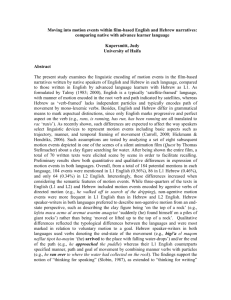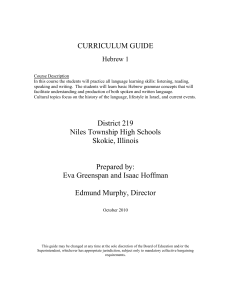Syllabus
advertisement
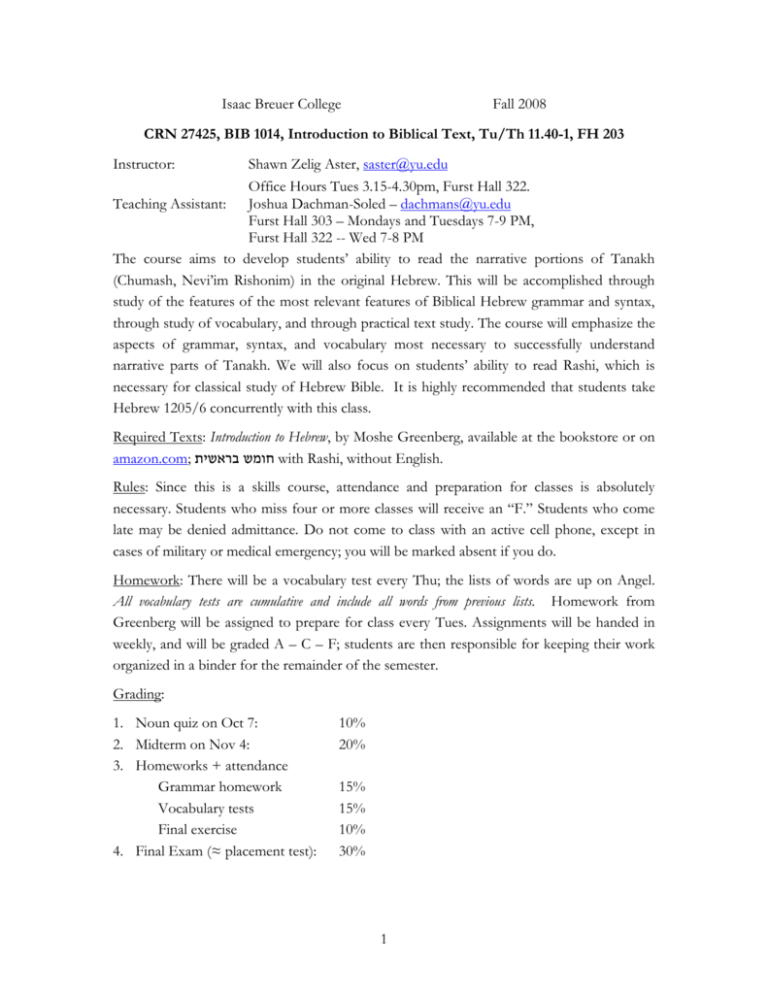
Isaac Breuer College Fall 2008 CRN 27425, BIB 1014, Introduction to Biblical Text, Tu/Th 11.40-1, FH 203 Instructor: Shawn Zelig Aster, saster@yu.edu Office Hours Tues 3.15-4.30pm, Furst Hall 322. Teaching Assistant: Joshua Dachman-Soled – dachmans@yu.edu Furst Hall 303 – Mondays and Tuesdays 7-9 PM, Furst Hall 322 -- Wed 7-8 PM The course aims to develop students’ ability to read the narrative portions of Tanakh (Chumash, Nevi’im Rishonim) in the original Hebrew. This will be accomplished through study of the features of the most relevant features of Biblical Hebrew grammar and syntax, through study of vocabulary, and through practical text study. The course will emphasize the aspects of grammar, syntax, and vocabulary most necessary to successfully understand narrative parts of Tanakh. We will also focus on students’ ability to read Rashi, which is necessary for classical study of Hebrew Bible. It is highly recommended that students take Hebrew 1205/6 concurrently with this class. Required Texts: Introduction to Hebrew, by Moshe Greenberg, available at the bookstore or on amazon.com; חומש בראשיתwith Rashi, without English. Rules: Since this is a skills course, attendance and preparation for classes is absolutely necessary. Students who miss four or more classes will receive an “F.” Students who come late may be denied admittance. Do not come to class with an active cell phone, except in cases of military or medical emergency; you will be marked absent if you do. Homework: There will be a vocabulary test every Thu; the lists of words are up on Angel. All vocabulary tests are cumulative and include all words from previous lists. Homework from Greenberg will be assigned to prepare for class every Tues. Assignments will be handed in weekly, and will be graded A – C – F; students are then responsible for keeping their work organized in a binder for the remainder of the semester. Grading: 1. Noun quiz on Oct 7: 2. Midterm on Nov 4: 3. Homeworks + attendance Grammar homework Vocabulary tests Final exercise 4. Final Exam (≈ placement test): 10% 20% 15% 15% 10% 30% 1 Teaching Assistant (TA): Rules and Responsibilities If you cannot attend scheduled tutorial hours assigned to this class (Mondays and Tuesdays 7-9 PM, Wed 7-8 PM) due to an academic conflict, notify the Instructor and the TA in writing designating the nature of the conflict no later than September 12th. Regulations Governing TA-Student Relationship The TA will keep a log of students who come to them for assistance. Student must sign in and the TA will record the date, the amount of time spent and the type of help given – e.g., assignment, text reading, class-review, etc. Any student missing more than 3 non-excused absences will be notified that he is barred from TA help and the teacher must notify the TA accordingly. The TA may not give students answers to class assignments, nor translate a text for a student who refuses to read it in Hebrew and attempt a translation, nor teach a student who has missed a class. If the student has been ill and missed classes, the student is required to get class notes, consult with classmates, and then to discuss the matter with his teacher who may instruct the TA to help him catch up with the missed work. Students encountering difficulties with the tutorial system should address their problems to the class instructor. If the difficulties have not been satisfactorily resolved, the student should notify the chair of the Oversight Committee, Professor David Berger, of the problem. Students must arrive either at the beginning of the tutorial session or at 8 PM (on Mondays and Tuesdays) so that the TA knows how best to utilize the hour. In the first five minutes of the session, the TA shall assess the students' problems. If there are only a few students, the TA may decide to work with them one on one. If there are many students, the TA may divide them into groups where the students will work together amongst themselves, with the TA rotating amongst them giving instruction and offering help. The TA may also choose to teach up-front, covering the topics which the students have acknowledged as presenting the major difficulties. 2 Semester schedule G = pages in Greenberg; VQ = vocabulary quiz Topics covered August 28 Breakdown of a פסוק September 2, 4 Subject and object אתas a marker of the direct Pages in G VQ on G 24, 25, 28, 38 object 9 Grammar of nouns: 11 Gender, number, segolates, broken plurals 16 October November Definiteness סמיכות Quizzes VQ on List 2 and G 25-37 18 Prepositions 23 Pronouns and pronominal 25 suffixes 7 Quiz on nouns and pronouns 28 Introduction to verbal system G 41-44 30 בנין קלperfect Handout 4 Midterm covering nouns, on G 32, 36 VQ on List 3 G 38-40, 64-70 VQ on List 4 VQ on List 5 basic בנינים, and קלperfect forms 6 בנין קל 11 VQ on List 6 participles, imperfects, G 49-57 imperatives, & infinitives 13 18 20 25 Other פִּ עֵ ל( בנינים, הפְ ִּעיל, ִּ נִּ פְ עַ ל, and )ה ְתפַ עֵ ל ִּ G 58-63 and 84-87 Verbs with direct object suffixes G 71-73 3 VQ on List 7 VQ on List 8 December 2 ו' ההיפוך G 74-77 December 4 Non-( ְש ֵל ִּמיםhollow verbs, final הverbs, initial אverbs, final א verbs, initial אverbs, initial נ verbs, initial gutturals, middle G 78-83, 88-92, 93-117 VQ on List 9 gutturals, final gutturals) 9 11 בראשית Review: Reading a פסוק 44:18-34 (G 167) 16 18 VQ on List 10 Reading Rashi 23 Final exercise due & review 24 Final exam Students with disabilities who are enrolled in this course and who will be requesting documented disability-related accommodations are encouraged to make an appointment with the Office of Disability Services, 646 685 0118 during the 1st wk of class. After approval is granted, please submit your accommodations letter to the instructor as soon as possible, to ensure successful implementation of the accommodation. 4
